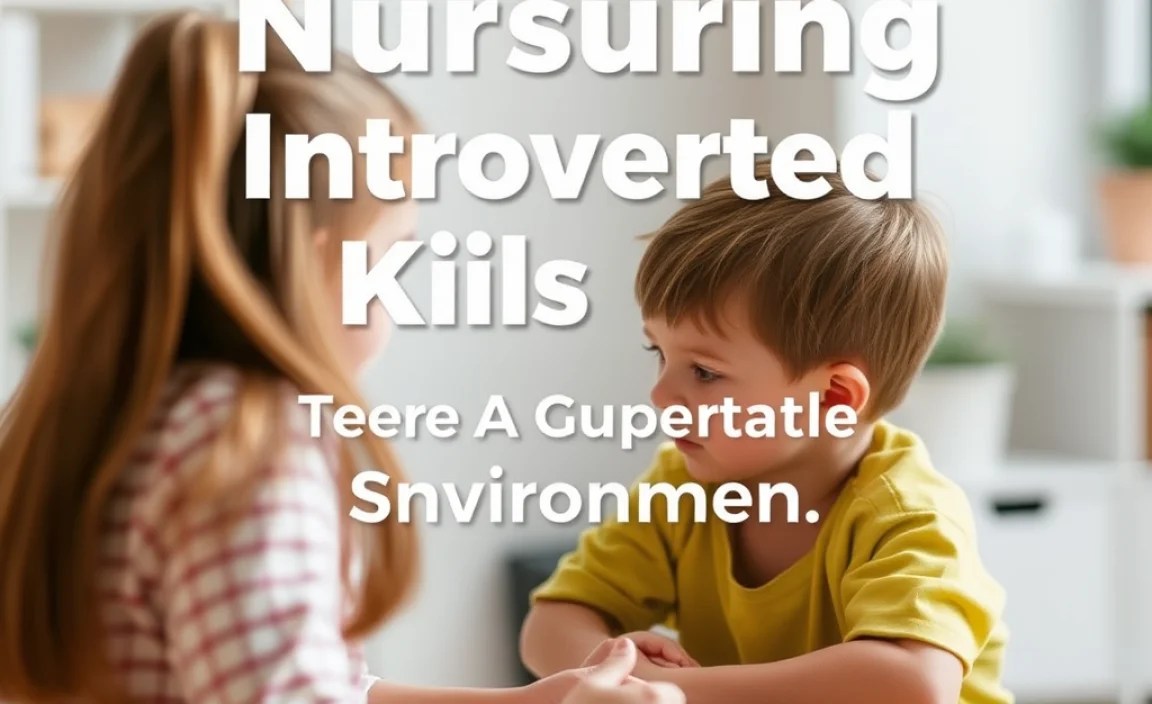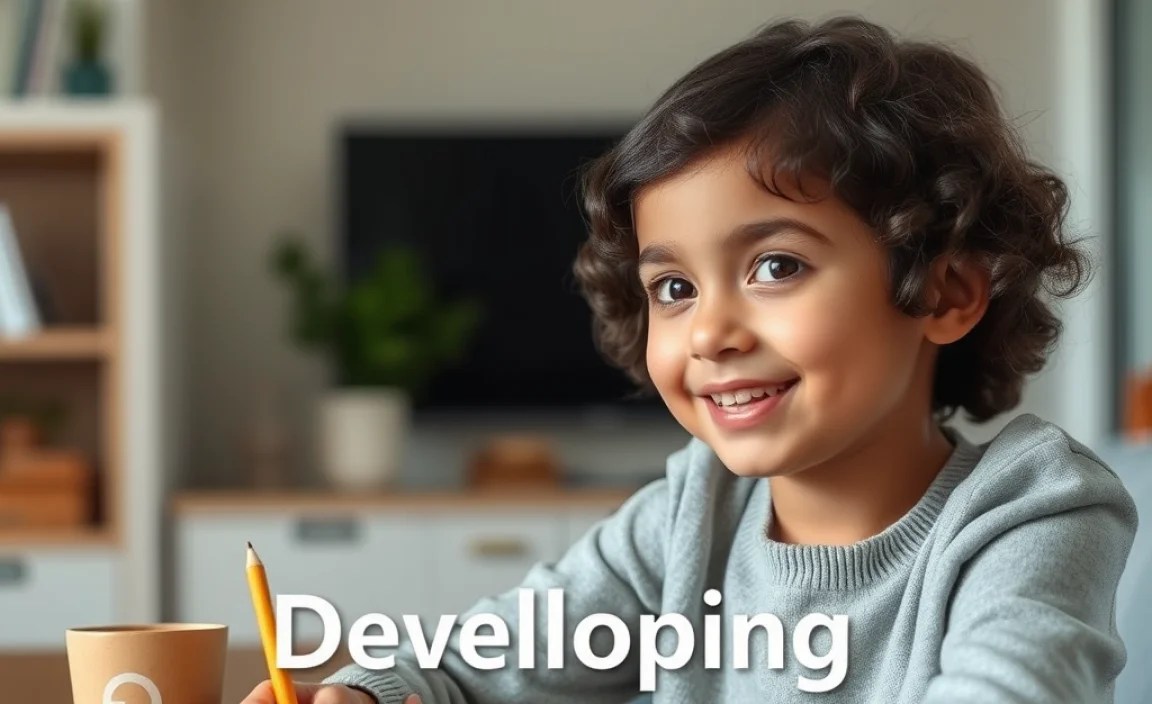Do you have a quiet child who enjoys alone time? Many parents do! Parenting introverted children can be different. Do you wonder how to help them grow? Introverted kids thrive in their unique way. Let’s explore how to support them.
At A Glance
Key Takeaways
- Introverted children need time alone to recharge.
- Encourage your child’s unique interests and hobbies.
- Parenting introverted children requires patience and understanding.
- Respect their need for quiet and personal space.
- Communication is key to understanding their feelings.
Understanding Introverted Children

Introverted children often enjoy spending time alone or in small groups. They tend to think deeply and may prefer reading or drawing to loud activities. These children might feel drained after social events. Parenting introverted children involves recognizing these traits. It’s important to respect their need for solitude. This does not mean they dislike others. Introverts simply recharge differently than extroverts.
- Respect their need for quiet time.
- Encourage activities they enjoy.
- Help them find like-minded friends.
- Acknowledge their feelings and thoughts.
- Create a peaceful environment at home.
- Introduce new experiences gradually.
Understanding your child’s personality helps you support their growth. Encourage them to express themselves. Create safe spaces where they feel comfortable. This builds their confidence. Remember, introverted children are unique. Their quiet nature is a strength. They often have rich inner worlds and creative minds.
Fun Fact or Stats : Around 30-50% of people are introverts!
What Is Introversion?
Introversion means being more focused on internal thoughts and feelings. Would you rather read a book than go to a big party? That’s typical of introverts. Introverted kids often enjoy imaginative play. They may prefer talking to close friends instead of big groups. Their quiet time helps them recharge and process ideas. Respecting this need helps them thrive. Do you know an introvert who loves to read or draw? They might be exploring whole worlds in their minds!
Why Are Some Kids Introverted?
Have you ever wondered why some kids are introverted? It often comes from their genes. Parents might notice this early on. Introverted children might shy away from loud noises or busy places. It’s important to remember their brains work differently. They process information deeply. This makes them thoughtful and observant. Introverted kids can be great listeners. Their quiet nature helps them notice details others might miss.
How To Support Their Needs
Supporting an introverted child starts with understanding. Do they need time to relax after school? Give them a quiet space. Encourage activities they enjoy, like art or reading. Listen when they share their thoughts. Make them feel heard. It’s also important to balance their alone time with social experiences. This helps them build social skills at their own pace.
Encouraging Social Interactions

Encouraging social interactions helps introverted children develop important skills. They might find large groups overwhelming. Start with one-on-one playdates. Slowly introduce them to small group activities. Praise their efforts when they try new things. Give them time to observe before joining in. This helps them feel comfortable. Remember, they may need breaks to recharge.
- Start with familiar environments.
- Encourage them to invite friends over.
- Listen to their concerns and fears.
- Help them develop conversation skills.
- Introduce games that require teamwork.
- Allow them to participate at their own pace.
Understanding their social limits is key. They might not be the first to join the fun. But once comfortable, they can enjoy themselves. Always be patient. Show them you value their efforts. This boosts confidence and encourages more interaction.
Fun Fact or Stats : Introverts can enjoy social events but need time alone to recharge.
Making Friends As An Introvert
Making friends can be tough for introverted kids. They often prefer deeper connections. Encourage them to join clubs or teams that interest them. This helps them meet like-minded peers. Guide them on how to start conversations. Ask them to share stories about their day. This practice builds their confidence. Do you know introverts who have close friendships? They often cherish a few deep connections over many casual ones.
Handling Peer Pressure
Peer pressure can be challenging. Introverts may feel stressed in social situations. Teach them to trust their instincts. Encourage them to stand up for themselves. Discuss different scenarios with them. Offer advice on handling pressure. Remind them it’s okay to say no if they’re uncomfortable. Help them understand their feelings matter. Would you feel pressured to fit in, or stand by your values? Support from parents makes navigating these challenges easier.
Building Communication Skills
Building communication skills is vital for introverts. Practice helps them express their needs. Encourage them to share feelings and thoughts. Role-playing different situations can be helpful. Praise their efforts in speaking up. Help them with active listening skills. This builds stronger relationships. Are you an introvert who enjoys deep conversations? Introverted kids often find great joy in meaningful talks!
Creating A Supportive Environment

Creating a supportive environment helps introverted children thrive. Make your home a safe space. Encourage their interests without pressure. Let them explore and learn at their own pace. Give them opportunities to express themselves. Understand their need for downtime. Balance activities with quiet moments. This helps them recharge and relax.
| Introverted Kids | Extroverted Kids |
|---|---|
| Need alone time to recharge | Recharge by socializing |
| Prefer small groups | Enjoy large gatherings |
| Deep thinkers and observers | Think out loud, share ideas |
| Enjoy quiet activities | Love excitement and action |
- Respect their need for quiet.
- Limit overstimulation in their environment.
- Encourage them to explore new things.
- Be patient with their learning process.
- Celebrate their achievements, big or small.
- Provide outlets for creativity and expression.
By creating a nurturing environment, you help your child grow. Encourage their explorations and discoveries. Provide tools for success. This foundation builds their confidence. They learn to embrace their true selves. Your support helps them achieve their full potential.
Fun Fact or Stats : Introverts often excel in creative fields, using their imagination and focus.
Setting Up A Comfortable Space
Creating a comfy space at home helps introverted kids relax. Choose a quiet corner. Fill it with books, art supplies, or cozy blankets. Let them personalize it. This becomes their retreat. They can recharge here after a long day. Do you have a special place you go to unwind? Introverted kids benefit from knowing they have a sanctuary to retreat to.
Balancing Activities And Rest
Balancing activities and rest is key for introverts. Ensure they aren’t overwhelmed by too many events. Allow time between scheduled activities. Watch for signs of stress or fatigue. Encourage them to express when they need breaks. This balance helps them enjoy activities while preventing burnout. Do you often feel tired after a busy day? Introverts also need time to recharge their energy.
Encouraging Creative Outlets
Introverted kids often enjoy creative outlets. Encourage their artistic talents. Provide them with materials and opportunities. Celebrate their creations. Invite them to share their work with family. This builds their confidence. Art, music, and writing are great outlets. These activities allow them to express their thoughts and feelings. Do you enjoy drawing or writing stories? Many introverts find joy in creating!
Developing Self-Confidence

Developing self-confidence in introverted children is important. Praise their achievements. Support their interests and hobbies. Encourage them to try new things. Celebrate their uniqueness. Let them know it’s okay to be themselves. Boosting their self-esteem helps them face challenges. They learn to trust their instincts and abilities.
- Recognize their strengths and talents.
- Celebrate their accomplishments, big or small.
- Encourage perseverance through challenges.
- Teach them to value their uniqueness.
- Help them set and achieve personal goals.
- Provide positive reinforcement and support.
Building self-confidence takes time. Be patient and supportive. Encourage them to step out of their comfort zone. Celebrate their efforts. This builds resilience and strength. They learn to embrace who they are. Your guidance helps them feel secure and valued.
Fun Fact or Stats : Introverts often have strong self-awareness, noticing their strengths and weaknesses.
Identifying Their Strengths
Identifying strengths helps introverts build confidence. Observe what they excel in. Are they great at solving puzzles or creating art? Highlight these strengths. Encourage them to develop their talents. This recognition boosts their self-esteem. They become more confident in their abilities. Do you feel proud of your skills and talents? Introverted kids, too, shine when their strengths are acknowledged.
Encouraging Positive Self-Talk
Positive self-talk helps introverts feel good about themselves. Teach them to replace negative thoughts with positive ones. Practice affirmations together. Remind them of their value and strengths. Encourage them to speak kindly to themselves. This builds resilience and self-love. Do you ever talk to yourself to feel better? Positive self-talk can be a powerful tool!
Celebrating Individuality
Celebrate your child’s individuality. Let them know it’s okay to be different. Encourage them to embrace their unique traits. Share stories of famous introverts who achieved great things. Support their interests, no matter how unusual. This acceptance helps them feel valued. They learn that their differences are strengths. Do you know someone who stands out in a crowd? Individuality makes each of us special!
Conclusion
Parenting introverted children involves understanding, patience, and love. Respect their need for quiet. Encourage their unique interests and talents. Support their social growth gently. Celebrate their individuality. Your guidance helps them shine. They learn to embrace who they are. Your love helps them thrive in their own special way.
FAQs
Question: How can I help my introverted child make friends?
Answer: Encourage them to join clubs or activities they enjoy. This helps them meet like-minded peers. Practice social skills at home. Organize small playdates. Praise their efforts when they try new things. Be patient and supportive. Building friendships takes time and practice. Your support helps them feel more confident.
Question: Why does my introverted child need alone time?
Answer: Introverted children recharge by spending time alone. This helps them process their thoughts and feelings. Alone time allows them to relax and unwind. It’s important to respect this need. It doesn’t mean they dislike being around others. It’s just how they regain their energy to thrive.
Question: How can I support my introverted child’s interests?
Answer: Provide them with resources and materials for their interests. Encourage them to explore and learn. Celebrate their achievements, big or small. Let them know you value their passions. Support their growth without pushing too hard. This helps them develop confidence and skills.
Question: What activities are best for introverted children?
Answer: Introverted children often enjoy quiet activities. Reading, drawing, and crafting are great options. Encourage them to try music or writing. Solo sports, like swimming or martial arts, can also be enjoyable. Choose activities that match their interests and allow them to express themselves.
Question: How do I communicate effectively with my introverted child?
Answer: Listen to their thoughts and feelings. Encourage open communication. Provide a safe space for them to share. Use gentle prompts when needed. Respect their need for time to process information. Be patient and supportive. Show them you value what they have to say.
Question: How do I balance social activities and alone time?
Answer: Keep a flexible schedule. Plan activities with quiet breaks in between. Pay attention to your child’s cues. Allow them to express their needs. Balance is key to prevent overstimulation. Encourage social interaction while respecting their need for solitude. This helps them enjoy both experiences.

